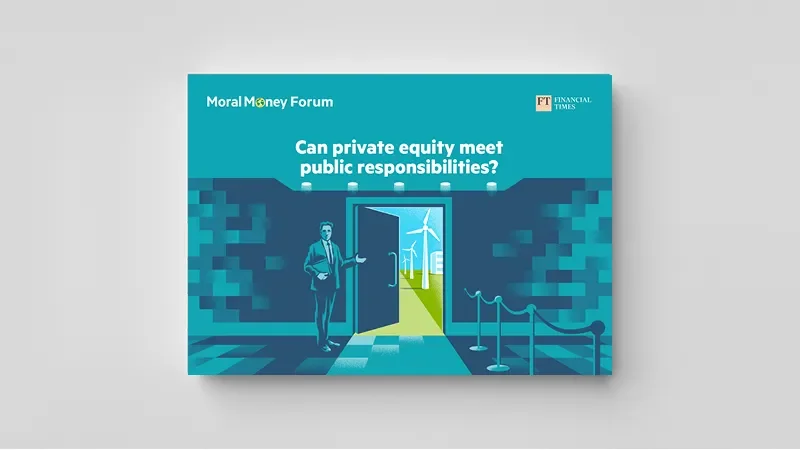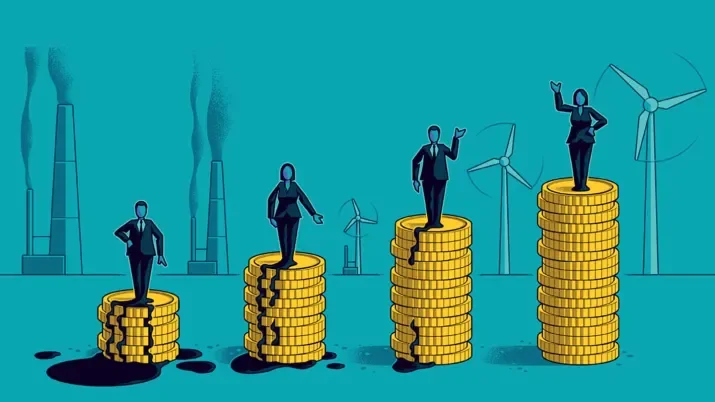The lure of making a direct impact
Asset management
“You don’t need to worry about shareholder resolutions – you just call the chief executive.” This statement by Andrew Howell, senior director of sustainable finance at US advocacy group Environmental Defense Fund, is referenced by Sarah Murray in her editorial. It reflects one of the main benefits of private equity: an investor has increased opportunity to enact change or influence strategy more directly.
In a world that is increasingly grappling with the challenge of climate change and boosting global sustainability, Murray, and those polled by the FT’s Moral Money team, are debating the role private equity will play in this effort. The quote from Howell stands out because – though we are a publicly listed company and clearly adhere to shareholder resolutions – the sentiment that appears to underpin it is arguably intuitive: real and effective change can feel more possible when you’re in a position to talk directly to the people who can make it happen in a more intimate exchange and discussion.

Balancing risk, return and impact
As an asset allocator, we witness first-hand the increasing appetite among investors for making a positive difference in environmental, social and sustainability issues. Sustainability-related challenges often require a longer time horizon to address, and this is where private equity-backed companies have an edge: due to their shielding from the public market, they generally have an increased risk tolerance for the implementation of transformational changes that might create value and/or positive impact in the medium or long term but could negatively impact the performance of the company in the short term.
Private equity therefore enables a type of investing public markets often can’t offer in the same way, with investors into public markets looking to annual and quarterly results reporting for evidence of returns. The J-curve in venture capital is a good illustration of this – it is expected and allowed that an enterprise takes time before it shows an increased financial return. This is somewhat comparable to a high-level start-up that’s lucky enough to be able to find its feet in a funded and protected environment. For the firms, private equity offers time for the nurturing of bold ideas, so they can take root and take shape. For investors, private equity can be a gateway to access unique growth opportunities.
The closest we can get to a longer-term vision in public markets is most likely impact investing, generating long-term financial returns alongside a positive impact on the world. At Vontobel, we embarked on our impact investing journey about 15 years ago. A bold idea at the time, it has been described by fourth generation family member Björn Wettergren, who is also on our board of directors, as a direct reflection of the founding family’s commitment to impact.
The importance of transparency
It is also important to note that part and parcel of investors’ appetite to make a difference is their demand for certainty regarding the non-financial impact an investment can bring. I’m reminded of a comment a Danish portfolio manager made in our 2023 Impact Investing Survey: “We want to be a responsible investor, but we also want a return. The two should go hand in hand.”
Indeed, from the nearly 200 institutional and professional impact investors we surveyed globally, a clear message arose that purpose and profit need to work in harmony. The impact investors we spoke to also emphasised the importance of transparency in building trust, including around processes, decision-making and reporting.
This is also true when it comes to the question of whether private equity can help finance a sustainable economy. As the poll by FT Moral Money confirms: if private equity activities appear opaque to outsiders, this has the potential to raise concern. Transparency is an area in which the transition of expertise from public to private markets can only benefit investors. And here I once again refer to the editorial by Sarah Murray: in her closing paragraph she argues that private equity needs to bring itself “out from the shadows”.
My takeaway is clear and simple: considering the sums of money private equity has at its disposal, it certainly has the potential to leverage positive change. Private equity can serve as a delicate tool carving out the space and time necessary for companies supporting a sustainable economy to bear fruit. But this tool needs to be sharpened with transparency, trust and knowledge to avoid harming the companies in the process. With the high demand from clients wishing to access private markets and make an impact, confirmed by many surveys we’ve conducted in recent years, and a growing number of opportunities in the field of sustainable finance, we all have a role to play. As asset and wealth managers we can keep building a sustainable economy and equitable society by bringing together our clients and moonshot ideas of young entrepreneurs.






